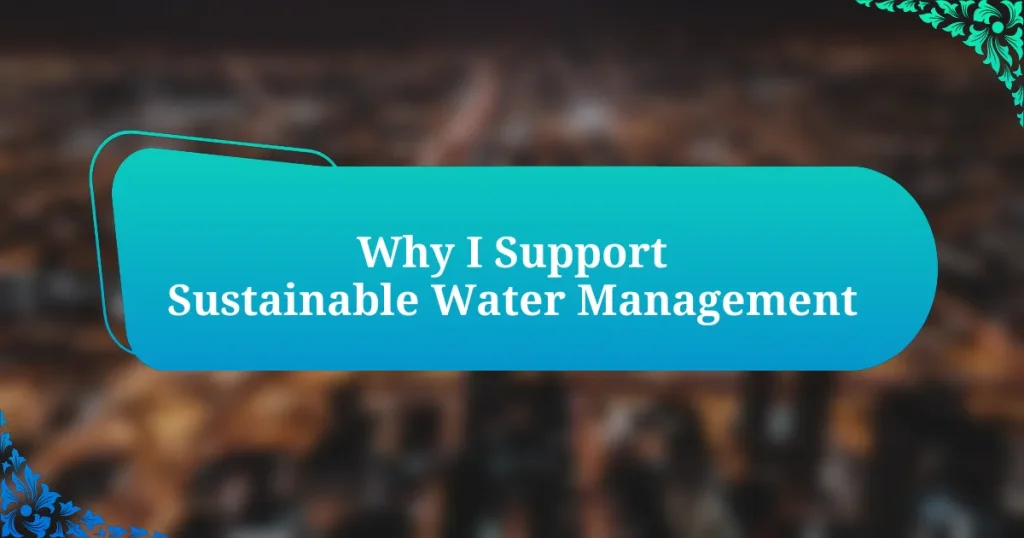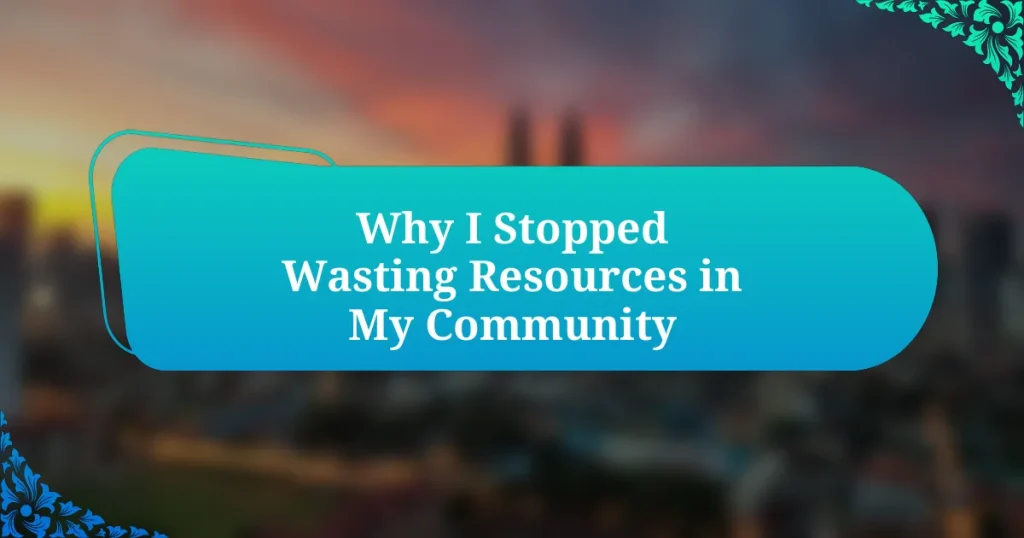Key takeaways:
- Smart city technology enhances urban management through data collection, improving services and fostering community engagement.
- Sustainable water management is essential for resource conservation, social equity, and long-term economic benefits.
- Community involvement is crucial for effective water management, as it empowers residents and amplifies their voices for meaningful change.
- The future of sustainable water initiatives will focus on integrating technology with community actions and fostering cross-sector collaboration.
Author: Clara Whitfield
Bio: Clara Whitfield is an acclaimed contemporary author known for her poignant storytelling and evocative prose. With a background in psychology, she intricately weaves themes of human emotion and personal growth into her narratives. Clara’s debut novel, The Echoes of Yesterday, received critical acclaim and garnered her a loyal readership. When she’s not writing, Clara enjoys exploring nature and visiting local coffee shops, where she often draws inspiration for her next story. She currently resides in Portland, Oregon, with her two rescue dogs.
Understanding smart city technology
Smart city technology represents a paradigm shift in how urban areas approach infrastructure and services. By integrating information and communication technologies, cities can improve their management efficiency and provide better services for citizens. Have you ever noticed how your daily commute feels smoother due to real-time traffic updates? That’s smart city technology at work, optimizing city life in ways we often take for granted.
The essence of smart city technology lies in harnessing data. Cities use sensors and IoT devices to gather information on everything from air quality to waste management. Personally, I was amazed when I learned that a simple water quality sensor could provide insights into a city’s overall health—such a small device making a big impact! These technologies not only enhance livability but also foster a sense of community as residents become more engaged and informed.
I often reflect on how smart city technology can create a more sustainable future. When cities prioritize data-driven decision-making, it leads to significant resource conservation and environmental protection. Isn’t it inspiring to think about a future where technology helps us tackle pressing issues like climate change? The potential for positive change feels limitless, and it’s exciting to be part of this journey toward smarter, more sustainable communities.
Importance of sustainable water management
Sustainable water management is crucial in addressing the ever-increasing demand for freshwater resources. During a recent trip to a city that practiced rainwater harvesting, I was struck by how effectively they utilized a naturally occurring resource. They collected and reused rainwater for irrigation and even in some household applications. This approach not only conserves potable water but also helps mitigate urban flooding, a win-win for the environment and local residents.
Furthermore, implementing sustainable practices promotes equity among communities. I recall volunteering in a neighborhood where access to clean water was a significant challenge. Witnessing how small-scale water purification projects transformed lives deepened my understanding of water’s role in social equity. When cities invest in sustainable water systems, they create opportunities for everyone, ensuring even the most vulnerable populations have access to this vital resource.
Moreover, the long-term economic benefits of sustainable water management are considerable. I’ve often shared conversations with urban planners who note that proactive water management reduces costs related to infrastructure repairs and energy usage. When investments are made in efficient irrigation or leak detection systems, cities can save not just money but also time and resources. Isn’t it fascinating how one thoughtful approach can lead to broader economic resilience?
Benefits of sustainable water practices
Adopting sustainable water practices can significantly enhance a community’s resilience to climate variations. I remember visiting a drought-affected region where innovative approaches like xeriscaping, which involves landscaping that reduces or eliminates the need for irrigation, were implemented. It was inspiring to see how these techniques not only preserved water but also beautified neighborhoods, showing that practical solutions can align with aesthetic values.
Another striking benefit of sustainable water practices is their role in conserving ecosystems. During a hike in a restored watershed, I felt a renewed appreciation for how clean water systems contribute to vibrant habitats for wildlife. This connection between sustainable management and biodiversity made me realize that protecting our water resources goes beyond human consumption; it’s vital for the entire planet’s health and vitality.
Additionally, the social cohesion that comes with community-based water management initiatives is noteworthy. I participated in a local clean-up event, where residents pooled their efforts to rehabilitate a riverbank. The camaraderie I felt during that day highlighted how sustainable practices can unify individuals around a shared purpose, fostering relationships that strengthen both the community and its environmental stewardship. Isn’t it rewarding to know that by working together, we can safeguard our water resources for future generations?
Advocating for community involvement
It’s fascinating to see how community involvement can transform water management efforts. I recall a town hall meeting in my neighborhood where local residents shared their ideas on improving our water conservation practices. The energy in the room was electric, and as people voiced their concerns and solutions, it became clear that when individuals feel empowered, they’re more likely to take ownership of their shared resources.
Encouraging dialogue among community members creates a sense of responsibility that can lead to actionable change. During a community garden project, I witnessed firsthand how neighbors collaborated to install rain barrels, turning what was once a mundane task into a joyous celebration of teamwork. This experience highlighted that sustainable water management isn’t just about technology; it’s about inspiring people to come together for a common cause.
Moreover, engaging local stakeholders amplifies the collective voice, making it difficult for decision-makers to ignore the community’s needs. When I joined a coalition advocating for water-saving incentives, it struck me how our combined efforts brought about real policy changes. Isn’t it empowering to realize that our voices, when amplified, can lead to meaningful progress in sustainable water management?
Future of sustainable water initiatives
The future of sustainable water initiatives lies in the seamless integration of technology and community engagement. I recently attended a workshop about smart irrigation systems that utilize sensors to monitor soil moisture levels. The excitement in the room was palpable as we discussed how these tech innovations could save water while allowing plants to thrive. It got me thinking: how can communities embrace these tools to not only conserve resources but also educate themselves about sustainable practices?
Another promising avenue involves the development of decentralized water management systems. Reflecting on my experience with a small local project, we implemented a community rainwater harvesting system that dramatically reduced our dependency on municipal water supply. This experience reinforced my belief that when communities take charge of their water sources, they become more resilient and adaptable to changing environmental conditions. Isn’t it inspiring to think that these grassroots approaches could be the backbone of future cities?
Finally, collaboration across sectors will play a crucial role in shaping sustainable water initiatives. I remember volunteering for an initiative that brought together schools, local businesses, and environmental organizations to create awareness about water conservation. Witnessing the synergy in that partnership revealed how collective knowledge and resources can spark innovative solutions. How might future partnerships redefine our approach to sustainability? The possibilities are endless, and they beckon us to engage in this vital conversation.













